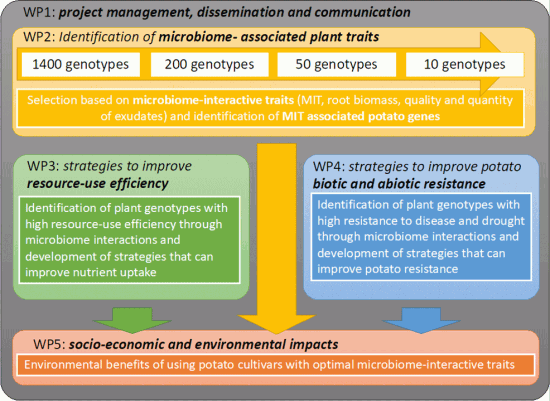Project themes
PotatoMETAbiome is a 3-year project with interdisciplinary research activities, structured with a well-balanced division between research and innovation, basic and applied research, field data collection and greenhouse experiments, as well as management. It will contribute to the achievement of sustainable potato cropping by integrating biological, social, economic and environmental dimensions while addressing smart breeding strategies, sustainable production and climate challenges. The project is composed of 4 main themes:
- Support breeding approaches to generate potato varieties that efficiently interact with soil microbiome, thus improving plant health, production and resilience
- Development of novel integrated crop and pest management methods that consider interactions between plants and soil organisms (“the plant as a meta-organism”), by improving resource-use efficiency, disease and stress resistance of potato crops
- Adapt and build resilience to biotic and abiotic stresses, by reducing chemical inputs while maintaining quality using biocontrol methods
- Evaluate the socio-economic and environmental impacts of the developed agronomic strategies for innovative and novel sustainable potato cropping system
Project structure
These will also be assessed for their higher resource use efficiency (WP3) and resistant to (a)biotic stress (WP4). Finally, a selection of 10 genotypes with highest microbiome interactions (WP2-4), resource-use capacity (WP3) and stress resistance (WP4) will be evaluated further for their performance (productivity, growth rate, quality, etc), disease resistance and microbiome interactions in field trials in 3 countries (WP2). To allow the comparison between MIT-selected genotypes and conventional potato cultivars not selected for microbiome interactions, we will include a reference cultivar, commercially produced by Averis, to the set of greenhouses and field experiments. In the greenhouses and field trials we will also evaluate whether the use of biologicals such as nutrient cycling stimulators (EcoStyle product based on protozoan and Bacillus) or microbial consortia with biocontrol or osmoprotectent properties (developed in WP4) can improve potato resource-use efficiency (WP3) and resistance to biotic and abiotic stressors (WP4), respectively. The data generated in field trails will be used to provide a social, economic and environmental perspective on how the new cultivars with higher MITs and associated biologicals can impact potato cropping, thus supporting sustainable production (WP5).

